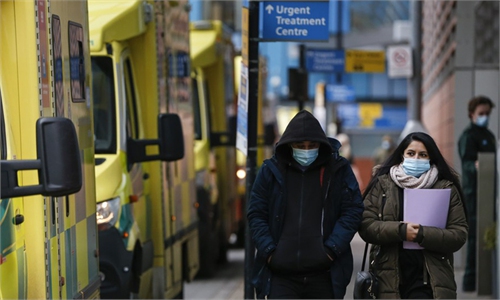UK to start world's first COVID-19 human challenge study, a necessary move under the premise of ensuring volunteers' safety: expert

A man walks past a sign warning of fines for not wearing a face covering at Waterloo Station in London, Britain, on Sept. 23, 2020. Photo: Xinhua
The UK announced on Wednesday to be the first country all over the world to run a COVID-19 human challenge study, which triggered heated global debate on its necessity. A Chinese respiratory expert reached by the Global Times admit the study's significance, under the premise of ensuring volunteers' safety.
Up to 90 volunteers aged 18 - 30 years will be exposed to COVID-19 in a safe and controlled environment to increase understanding of how the virus affects people, British Government announced on its official website on Wednesday, noting that the study has been approved by UK's clinical trials ethics body. The study will begin within one month.
Wang Guangfa, a respiratory expert at Peking University First Hospital, told the Global Times on Thursday that this study has significant meaning to promote people's understanding toward the novel coronavirus.
What is the smallest amount of novel coronaviruses that can cause human infection? How long are the patient still contagious after they show signs of infection? What kind of patients get infected with COVID-19 that causes severe illness? To what extent can wearing masks and washing hands prevent the infection? There are so many questions we don't know. This kind of human challenge study will provide the data to answer these questions bit by bit, Wang said, noting it will play an important role in developing effective COVID-19 vaccines and treatments.
Backed by a £33.6 million ($ 46.8 million) UK government investment, the first-of-its-kind study will involve establishing the smallest amount of virus needed to cause infection, which will give doctors greater understanding of COVID-19 and help support the pandemic response by aiding vaccine and treatment development, according to the announcement.
However, such trials are controversial. Most cases and deaths are in older people, while the trial will use young volunteers under 30 years old. Some are questioning whether the data from the young group can help develop COVID-19 treatments.
"No scientific study can be absolutely safe, and there must be a degree of risk involved. But I believe that the experts in the UK will reduce the security risks to the lowest level to the best of their capability. The study has been approved by the ethics committee and the UK government, so it has been legally and ethically vetted, and there is a need to protect the volunteers' informed consent rights," Wang noted.
He agreed with the study plan to recruit young volunteers so as to keep them at the lowest risk. "The premise of medical research is to ensure safety to the largest extend," Wang noted.
The immune responses of young and old people may differ, but some are the same and data can also be useful for the elderly, he said.
The study will use the version of the virus that has been circulating in the UK since last March which has been shown to be of low risk in young healthy adults, so people doubt whether the study result can help contain current variant virus.
This is the world's first COVID-19 human challenge study, and nobody can really tell what happened during the research. As a result, use of the relative safe virus at current stage is right. When the research has some achievements, maybe different variants can be tested in the future, Wang explained.
Wang believes that Britain's scientific research foundation and ethical cognition are relatively mature. The epidemic situation in the UK is still serious and there are many variant viruses. Such research has been attached great importance and given a large amount of financial support. Meanwhile, it has also received a relative high recognition from local public.
However, Wang said that there are still risks for volunteers. The fatality rate for the novel coronavirus was around 0.6 percent, according to World Health Organization.
"The long-term effects of infection with COVID-19 are unknown. Although the infection won't cause death in volunteers and they are cured after the research, whether the prevalence rate of some other diseases, like the tumor and autoimmunity diseases, would be higher for them in a long-term follow-up, is not known for certain," he said.
He does not expect other countries to conduct such trials. "Careful trial design, sufficient funding, adequate medical care, and good social acceptance are all necessary conditions for conducting such trials," he explained.
People know so little about the virus, uncontrollable things can happen, and the best security assessments are required at all stages of the trial, Wang noted.


